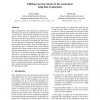Free Online Productivity Tools
i2Speak
i2Symbol
i2OCR
iTex2Img
iWeb2Print
iWeb2Shot
i2Type
iPdf2Split
iPdf2Merge
i2Bopomofo
i2Arabic
i2Style
i2Image
i2PDF
iLatex2Rtf
Sci2ools
124
click to vote
USS
2010
2010
Fighting Coercion Attacks in Key Generation using Skin Conductance
Many techniques have been proposed to generate keys including text passwords, graphical passwords, biometric data and etc. Most of these techniques are not resistant to coercion attacks in which the user is forcefully asked by an attacker to generate the key to gain access to the system or to decrypt the encrypted file. We present a novel approach in generating cryptographic keys to fight against coercion attacks. Our novel technique incorporates the user's emotional status, which changes when the user is under coercion, into the key generation through measurements of the user's skin conductance. We present a model that generates cryptographic keys with one's voice and skin conductance. In order to explore more, a preliminary user study with 39 subjects was done which shows that our approach has moderate falsepositive and false-negative rates. We also present the attacker's strategy in guessing the cryptographic keys, and show that the resulting change in the passw...
| Added | 15 Feb 2011 |
| Updated | 15 Feb 2011 |
| Type | Journal |
| Year | 2010 |
| Where | USS |
| Authors | Payas Gupta, Debin Gao |
Comments (0)

